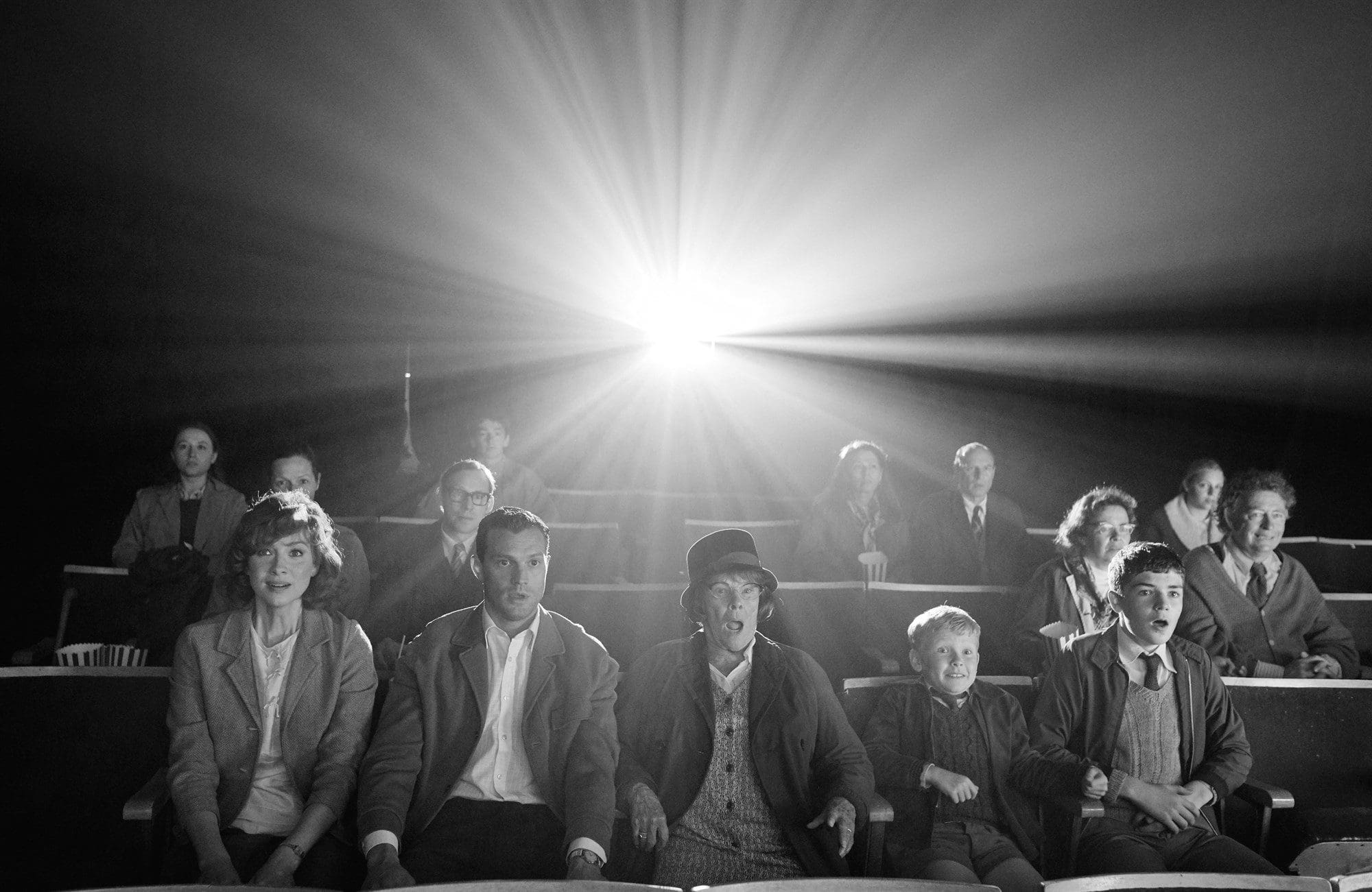
Kenneth Branagh has spent much of his writing/directing/acting career adapting classic works–many of the Shakespeare’s–but with his latest film, Belfast, which he wrote and directed, Branagh reaches back into his own childhood for inspiration. Loosely based on his early years in Northern Ireland in the late 1960’s just as The Troubles began between Catholics and Protestants, the film follows Branagh’s stand-in, Buddy (Jude Hill). Too young to fully understand the violence that suddenly rips apart his once idyllic neighborhood, Buddy is more concerned with his Ma (Catriona Balfe) and Pa’s (Jamie Dornan) marital troubles, his Pop’s (Ciarán Hinds) illness and talking to the girl he’s crushing on in his class. In theory, that’s a lot of heavy stuff for a child to confront, but Belfast is so tinged with affection and nostalgia that it succeeds largely as a hear-warming family drama — even if it can be a bit slight.
Perhaps Branagh’s biggest achievement in crafting the film is in recreating the Belfast of his youth. The most distinct and immediately noticeable way Branagh gives the audience that sense of time and place is through pop culture. The soundtrack is filled almost exclusively with songs by fellow Northern Irishman, Van Morrison, whose music would have been popular during Branagh’s childhood. In part, the choice gives the audience a sense of the kind of music Buddy’s parents played and how it unconsciously influenced his own taste. However, by also choosing Morrison’s more upbeat and romantic songs, the film itself and Buddy’s experience of his life, feels romanticized. Sure, Buddy’s parents’ marriage may be falling apart and the neighborhood could break into violence at any moment, but none of that seems too worrying when Van Morrison sounds so joyful.
While the films and television Buddy consumes are no less ubiquitous than Morrison’s music, they serve a slightly different purpose. Scenes of Buddy and his brother Will (Lewis McAskie) watching Star Trek on TV while their parents fight quietly in the background or Buddy staring wide-eyed and slack-jawed at High Noon convey the profound effect art has on him. The most remarkable scene, though, comes when Buddy and his Granny (Judi Dench) attend a staged performance of A Christmas Carol. Though much of the film is in black-and-white, where the art Buddy consumes is originally in color, it appears in color in the film as well. In perhaps the film’s most incredible image, as a black and white Buddy and Granny look on, we see the actors on stage reflected in full color in Granny’s glasses. The moment emphasizes how profoundly these early artistic experiences influenced Branagh and it’s one of many striking images in the film.
Indeed, Branagh, cinematographer Haris Zambarloukos and editor Úna Ní Dhonghaíle create a gorgeous film. Dhonghaíle’s editing is, from the first scene, jarringly swift. No shot seems to last more than a few seconds and every scene is really a compilation of mostly medium shots that establish who and what is happening while rarely giving us a wide establishing shot. That said, Zambarloukos is very deliberate in his camera placement. Each image, in part because they’re so short, feels like an artfully staged photograph come briefly to life. The longest and most complex shots often show multiple characters sharing dialogue, each person at different depths within the image. For instance, Ma and Granny discussing The Troubles over the TV in the foreground while the boys watch Star Trek in the background. Or Buddy in extreme close up in the foreground, passed out with lips covered in chocolate as his parents discuss potentially separating in the background, the edge of a Christmas tree in the middle giving the whole scene a potent melancholy. Every moment is a feast for the eyes and whatever else Belfast may be, it’s at least one of the most visually striking films of the year.
That said, while Branagh certainly creates a compelling milieu of Buddy’s life at that specific moment in history, the whole film is so light-hearted and warm that the serious subjects not only make very little impact, but barely register in comparison to scenes of Buddy singing “Chitty Chitty Bang Bang” in the theater with his family or doing well in school. Even when Buddy and his family are caught in a riot, Belfast‘s tone is so committed to its tone that not even that life-changing moment feels dire. Rather, there and throughout, every emotional beat, both happy and sad, seems to make the same impact and they can all feel inconsequential as a result.
This tonal weirdness is possibly never stranger than during the wake held after Pop’s funeral. Considering how beloved he was to the family, you’d expect the scene to be somber. Instead, it turns into a joyous dance number reaffirming Ma and Pa’s love. As a smiling Granny and Buddy look on, Ma and Pa flirt across the dance floor, him singing and her dancing, until they finally twirl together in the dance floor as everyone around them cheers.
Emotionally and logically, the choice makes a loss that should be devastating feel irrelevant, but Branagh isn’t trying to process his childhood traumas through Belfast. Rather, it is his childhood filtered through the rose-colored glasses of memory. Bad things happen, but Buddy is simply too young to understand them in a way that would make them more impactful than the primal terror of his parents’ marital issued. For some, the way Belfast breezes over its serious subjects will leave it feeling too slight, even cloying in its constant will to beguile the audience. For the rest, that charm will prove impossible to resist, leaving even the hardest-hearted smiling.


Comments are closed.